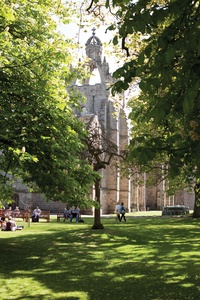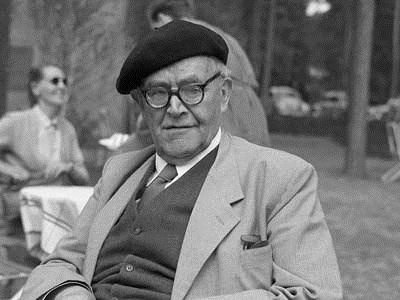
Systematic Theology is a major research concentration in Divinity at Aberdeen. The department has a large and flourishing community of postgraduate students from the UK and overseas, attracted by the high quality of teaching and supervision of our faculty and by the energy and warmth of our community of scholars.
Many students come to Aberdeen to study topics in constructive Christian doctrine or the theologies of classical and modern Christian thinkers, and their work is enhanced by our close working relations with those undertaking research in other theological fields, especially moral, philosophical and practical theology, the history of Christianity, and the study of Scripture.
Click the tabs below for more information on what Aberdeen has to offer by way of research expertise and doctoral supervision, how to apply, and what students can expect when studying with us.
- Studying Systematic Theology at Aberdeen
-

Doctoral study at Aberdeen revolves around the doctoral thesis. Over the length of their programme (either full- or part-time), students will research and write an original contribution to scholarship on their chosen topic, in close consultation with their supervisor. To learn more about potential supervisors, click the 'Supervising Staff' tab. For more information about some of the topics and figures the department specializes in, click the 'Areas of Study' tab. For more about how to apply, click here.
Doctoral study at Aberdeen also extends beyond independent research. Students and staff meet year-round in the Systematic Theology Research Seminar, which is not only an opportunity to hear and respond to papers by world-leading guest speakers and staff and to study and discuss key texts, but is also an opportunity for doctoral students to present their own work to other students and staff in a friendly and supportive forum. In addition, doctoral students in Systematic Theology are welcome to join other Research Seminars in the department, as well as to audit Masters-level courses. Students at Aberdeen not only receive regular one-on-one supervision, but also stimulation and support from their student colleagues and other Divinity faculty.
Research at Masters or PhD level can be undertaken at Aberdeen on a full-time or a part-time basis, and it can also be done on campus or at distance. However, one of the most exciting features of studying Systematic Theology at Aberdeen is the large full-time, on-campus cohort of students who regularly study, socialize, worship, and even reside together. On-campus students often enjoy additional discussion and camaraderie with one another and with staff in informal gatherings that take place throughout the year. For all these reasons, and where circumstances permit, we especially encourage applicants to consider studying with us in person in Aberdeen.
For students who are unable to join us in person in Aberdeen, we have excellent provision, including distance seminars, reading groups, occasional international seminars, fully recorded main events, online dialogues, opportunities for conference meetings, and special invitations to join us in Aberdeen for concentrated study and peer interaction. All distance students have full access to our large and growing digital collection at the Sir Duncan Rice Library.
- Supervising Staff
-

Professor Paul Nimmo (paul.nimmo@abdn.ac.uk): Paul Nimmo offers supervision in constructive systematic theology; historical and contemporary Reformed theology; historical and contemporary Scottish theology; the doctrine of God; Christology and pneumatology; soteriology; ecclesiology and sacramentology; the theology of Friedrich Schleiermacher; and the theology of Karl Barth.
Professor Philip Ziegler (p.ziegler@abdn.ac.uk): Phil Ziegler offers supervision in contemporary Christian dogmatics including: eschatology, theology and apocalyptic; the doctrines of justification and election; Christology and soteriology; the theological bases of Christian ethics and politics; and the history of modern Protestant theology, in particular the theologies of Karl Barth, Dietrich Bonhoeffer and Søren Kierkegaard.
Professor John Behr (john.behr@abdn.ac.uk): John Behr offers supervision in Early Christian (Patristic) thought; modern Eastern Orthodox theology; scriptural interpretation and anthropology; questions of life and death; and the hermeneutics of reading texts. He is particularly interested in the theologies of Origin of Alexandria, Irenaeus of Lyons, Clement of Alexandria, Diodore of Tarsus, Theodore of Mopsuestia, and Gregory of Nyssa, and how their thought intersects with contemporary hermeneutics and phenomenology, especially the work of Michel Henry.
Professor David Clough (david.clough@abdn.ac.uk): David Clough offers supervision in constructive systematic theology. He has a particular interest in theological engagements with the more-than-human world, theology and applied sciences, theology and race, and the theology of Karl Barth.
Dr Sara Mannen offers supervision in the classical and modern doctrine of God and trinitarian theology; the intellectual and philosophical background to modern and contemporary systematic theology; constructive systematic theology; the topic of theology and power; Christology, pneumatology, and soteriology; evangelical theologies (especially North American); the theology of Karl Barth. She is interested in the creative, critical, and constructive use of the broader theological tradition for contemporary theology and theological issues.
Affiliated Staff:
Dr Daniel Pedersen (daniel.pedersen@abdn.ac.uk): Daniel Pedersen is a Lecturer in Philosophical Theology. He supplements supervision in a number of areas in Systematic Theology. These include, for example, Reformation and post-Reformation theologians; the theology of Friedrich Schleiermacher; creation and providence; eschatology; the doctrine of election and the doctrine of God; and current theological conversations, including matters involving theology and science.
- Areas of Study
-

The department as a whole specializes in theology since the Reformation, with interests across the core doctrines of Christian theology, including: the meaning and use of Scripture, Christ and salvation, the doctrine of the church, the sacraments, and eschatology.
In particular, the department offers a strong concentration of expertise on the theology of Karl Barth and Dietrich Bonhoeffer; on eighteenth and nineteenth-century theologians such as John Wesley, Friedrich Schleiermacher, and Søren Kierkegaard; on Reformation figures such as Huldrych Zwingli, Martin Luther, and John Calvin, as well as on the later Reformed scholastic period; and on patristic theologians such as Origen of Alexandria, Irenaeus of Lyons, and Gregory of Nyssa.
At Aberdeen, students can study these theological topics and figures in both historical and constructive modes of enquiry, as well as in some combination of the two, and the department welcomes proposals with either or both ends in mind.
- Barth Studies
-
Throughout his life and after his death, the theology of Karl Barth (1886-1968) has provoked vigorous discussion and engagement.
From the initial responses to his work in German-speaking Europe, through its dissemination and reception in the English-speaking North Atlantic world, to its current impact on various forms of intellectual reflection, Barth's work has exercised a constant, often remarkable, influence on academic, ecclesial, and public discourse. (For more information on Barth and his legacy see this video by Tom Greggs).

Barth in Aberdeen
The University of Aberdeen has a unique concentration of Barth scholars, with staff teaching courses and supervising projects relating both to the work of Barth itself and to the relationship of Barth to other theologians and discourses at both undergraduate and postgraduate level. The Divinity Department also hosts and sponsors various events and activities related to the theology of Barth, including conferences, lectures, and seminars. The Aberdeen University Library holds the David Lewis collection of Karl Barth literature.
Links
Some helpful links for further information and resources on Barth's theology and Barth studies include:
- Bonhoeffer Studies
-
Dietrich Bonhoeffer (1906-1945) is one of the most prominent voices in modern theology. From the 1960s to the present his work has been at the centre of a number of important theological developments and debates.
Moreover, his dramatic involvement in the resistance against Hitler, and consequent execution, has resulted in a widespread interest in his work outside of the academy. Today, he is among the most widely read theologians in Europe, North America and beyond.
For further background on Bonhoeffer see this video by Professor Tom Greggs, and for the ongoing relevance of Bonhoeffer see this article by Professor Philip Ziegler.
.jpg)
Some helpful links for further information and resources on Bonhoeffer's theology and Bonhoeffer studies:
- How to Apply
-
Application to study Systematic Theology at Aberdeen is competitive. The strongest applicants will have (1) adequate preparatory study, (2) a good fit with their intended supervisor, and (3) a well-developed proposal.
This section, together with more general information found here and here, is intended to help prospective students put together the strongest application possible.
Applicants for the PhD in Systematic Theology are normally required to have completed significant prior study in theology. Successful applicants are likely to have a minimum of a high 2.1 or a Masters. In terms of GPA, successful applicants are likely to have at least a 3.3 GPA in an area of related study or a Masters. Applications will be considered individually, but a masters-level course of study is highly encouraged.
In preparation for a PhD, Divinity at Aberdeen offers two different options for masters-level study.
The first is a taught MTh, where students undertake advanced coursework in the form of discussion-based seminars. Information about that program and how to apply can be found here.
The second is an MTh by research in which students have an opportunity to research and write on their own proposed topic in consultation with a supervisor, just as they would for a PhD thesis, but at a smaller scale. Information about that program and how to apply can be found here.
Either in combination with a preparatory Masters, or in place of one, students desiring further time and study for their PhD are encouraged to consider the Extended PhD. The Extended PhD is a four-year programme for full-time study, or a six-year programme for part-time study. For more information, click here.
Once applicants have considered their course of study, the next step is to develop a research topic and match that interest with a potential supervisor. With a proposal in mind, applicants are encouraged to contact their potential supervisor directly by email. Click on the 'Supervising Staff' tab for detailed information about staff research interests. Clicking on staff names will link to their contact page with more information about them and their work.
Potential supervisors will ask students to prepare the following documents:
- a concise CV, including grades awarded for all degrees gained
- an academic writing sample in the discipline of theology of substantial length in English
- a research proposal for the MTh or PhD programme in view
Serious inquiries into doctoral study in Systematic Theology at Aberdeen are considered twice a year - late winter and early summer - in time for students to enter their studies as soon as the following September or January respectively.
- Links
-
Links for further information about the study of Systematic Theology at Aberdeen include:
- Information about applying for doctoral study at Aberdeen can be found here and here.
- Information about the taught masters (MTh) can be found here.
- Information about the masters by research (MTh) can be found here.
Links to journals and academic organizations in which faculty are involved include:
